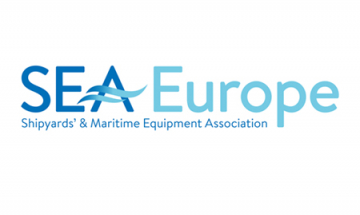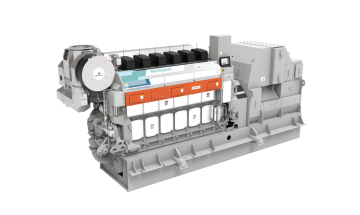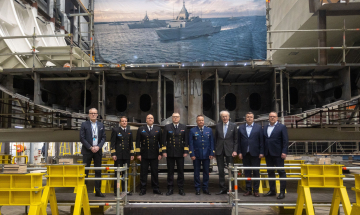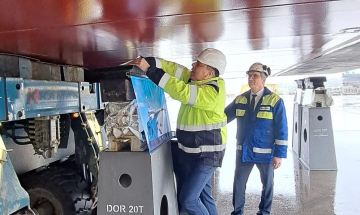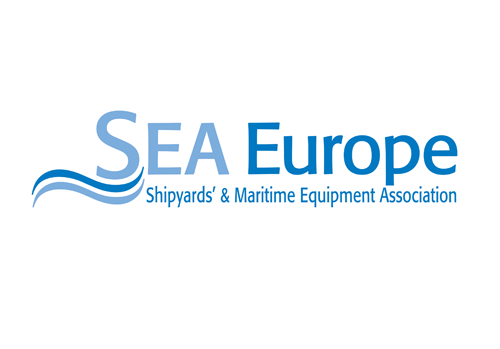
Commissioner Breton endorses maritime technology and shipbuilding among Europe's most strategic industries
Brussels, 21st April 2020
In a written answer to a Parliamentary Question published on 16 April, the EU Commissioner for Internal Market acknowledged that maritime technology and shipbuilding are among Europe’s most strategic industries. Mr. Breton stated his support for the maritime technology industry as a relevant source of employment and growth and recognised the need for the EU to preserve and strengthen the EU’s global leadership in green shipping technologies.
The Parliamentary Question, entitled “Policy to preserve a strategic EU industry”, was tabled in January by MEP Izaskun Bilbao (RE), Jan-Christophe Oetjen (RE) and Inma Rodríguez-Piñero (S&D), to enquire the newly appointed Commissioner about his plans for the maritime technology industry, crucial to the EU’s Green Deal and the decarbonisation of waterborne transport.
In reaction to this written answer, MEP Izaskun Bilbao said: "The fight against climate change and the promotion of sustainable development and digitalisation are a great opportunity for a strategic sector for Europe such as shipbuilding. European policies must be aimed at maintaining the technological leadership of our Union in this sector and protecting our shipyards against social and environmental dumping from other states. I therefore support the Commissioner's idea of promoting innovation and development and of supporting collaboration between all agents to maintain our technological leadership. Furthermore, we must encourage increasingly clean and efficient ships to dock and set sail in our ports. I am sure that, with these policies, the best ships in the world will continue to be 'made in Europe'."
MEP Jan-Christophe Oetjen added that “The EU’s industry strategy must clearly take measures to ensure competitiveness of the European shipbuilding and maritime technology companies in a global market. Digitalisation is a big opportunity and regulation for a sustainable maritime sector are addressed best on a global level. The Green Deal framework has to take into account that the scope of maritime industry is global.”
In their question, the MEPs raised their concerns about the competitiveness of Europe’s maritime technology industry, as the only manufacturing sector in Europe not benefiting from any WTO or EU trade defence instruments to protect itself from aggressive state-led competitive distortions and unfair trade practices. In his response, Commissioner Breton acknowledged this challenge and confirmed the European Commission’s full commitment to tackle these significant distortions with their negative direct and indirect impacts on EU companies across all maritime technology and shipbuilding segments.
MEP Inma Rodríguez-Piñeiro welcomed Mr Breton’s statement: "The EU's firm commitment to digitalisation, sustainable development and the fight against climate change must become an opportunity for our naval sector, but this will only be possible if they participate in the international market in a framework of fair competition with third countries. Therefore, I believe the determination of the European Commission to fight against social and environmental dumping in this strategic sector is very good news, something that I also commit myself to monitor from the Committee on International Trade to ensure that the European naval sector continues to be a leader in innovation, in sustainable mobility, profitable and, of course, the thousands of jobs it generates continue to be protected".
Mr Breton also referred to the EU’s new Industrial Strategy as a tool to support the maritime technology industry through upcoming measures to address distortive effects caused by foreign subsidies, an Intellectual Property Action Plan and a renewed focus on innovation, investment and skills. The strategy recognises shipbuilding as one of the industries that “has both the responsibility and the potential to drive the twin transitions, supporting Europe’s industrial competitiveness and improve connectivity”, and adds that “In this view, the EU strategy announces a Comprehensive Strategy for Sustainable and Smart Mobility with measures to help make the most of the sector’s potential.”
In addition to the measures foreseen in the new EU Industry Strategy, the Commissioner envisages the possibility to complement it “if necessary and in line with the international obligations, by specific actions to support some sectors” and explicitly refers to the ‘Zero-emission waterborne transport’ co-programmed partnership under Horizon Europe, which aims to mobilise the sector towards the achievement of environmental goals while reinforcing and regaining lost markets through a green technology lead.
Christophe Tytgat, SEA Europe’s Secretary General, commented “I warmly welcome Mr. Breton’s answer. Not only does he recognise the strategic dimension of maritime technology and shipbuilding for Europe and its leadership on green maritime technologies and vessels. He also acknowledges the sector’s challenges in terms of aggressive competitive distortions and unfair trade practices and the need to act upon them, if necessary, with sectoral measures”.
“With the Covid-19 crisis strongly hitting the maritime technology industry and adding pressure to the already existing imbalanced market, it is more urgent than ever that the EU adopts an ambitious long-term strategy for a strong maritime industry. This strategy should be a win-win for all maritime stakeholders and create favourable framework conditions for global competitiveness, strong research, development, deployment and market uptake of innovative green and digital products (for instance through the ‘Zero-emission waterborne transport’ co-programmed partnership’) and a strong workforce. Europe’s maritime industry needs a strong European Union. Only in this way, Europe will be able to remain a global maritime power and achieve its ambitious goals on climate neutrality, defence and security, and the blue economy”, Mr. Tytgat concluded.
Background Note: SEA Europe represents close to 100% of the European shipbuilding industry in 16 countries, encompassing the production, maintenance, repair and conversion of all types of ships and floating structures, commercial as well as naval, including the full supply chain with the various producers of maritime systems, equipment material, and services.
For further information please visit www.seaeurope.eu or contact:
Christophe Tytgat, Secretary General, ct@seaeurope.eu
Tel: +32 (0)2.230.32.87
Additional information:
• Parliamentary Question for written answer to the Commission (Rule 138)
Subject: Policy to preserve a strategic EU industry
• Written Answer given by Mr Breton on behalf of the European Commission
• SEA Europe’s Covid-19 Declaration
Read the original press release here.

